- Home
- Anthony Burgess
Honey for the Bears
Honey for the Bears Read online
BOOKS BY ANTHONY BURGESS IN W. W. NORTON PAPERBACK
* * *
Re Joyce
Tremor of Intent
Nothing Like the Sun
The Wanting Seed
A Clockwork Orange
The Doctor Is Sick
The Long Day Wanes: A Malayan Trilogy
To
Maurice Edelman
Contents
Part One
Chapter 1
Chapter 2
Chapter 3
Chapter 4
Chapter 5
Chapter 6
Chapter 7
Chapter 8
Chapter 9
Chapter 10
Chapter 11
Chapter 12
Part Two
Chapter 1
Chapter 2
Chapter 3
Chapter 4
Chapter 5
Chapter 6
Chapter 7
Chapter 8
Chapter 9
Chapter 10
Chapter 11
Chapter 12
Chapter 13
Copyright
B Пeтepбypre мы coйдëмcя
cнoвa,
Cлoвнo coлнцe мы пoxopo-
нили в нëм.
O. Mandel’shtam
(We shall meet again in Petersburg, as
though there we had buried the sun.)
PART ONE
* * *
1
‘AND WHAT,’ ASKED (LOUDLY BECAUSE OF THE MUSIC) THIS patrician parrot of a Tiresias from its wheelchair, skirt or trousers hidden by tartan rugs, ‘might be your purpose in going to St Petersburg?’
‘Tourism,’ lied Paul Hussey. The music, after its climax of shocking brass, settled to vapid rocking waltzing fluting. A most clerkly man behind the wheelchair, with eyes that the music seemed to make water, got in quickly with:
‘It’s the same with homosexuals. People always expect them to be at it all the time. Well, it stands to reason they can’t. I don’t see how they can be homosexual when they’re asleep or in the W. It’s the same with Communism.’
‘That will do very well, Madox,’ said his master or mistress indulgently. The face was trenched and riven, as by a killing life of metaphysical debauchery. That was it, decided Paul: a head that philosophy had unsexed, some final Shavian achievement. He had seen a head like it on television newsreels: an old proud eagle squatting in Whitehall among students, banning the Bomb. But these oyster-coloured eyes surveyed with disdain the scruffy redbrick layabouts who nearly filled the Cultural Saloon, the nose twitched at them.
‘If you’ll allow me, Doctor,’ said Madox. The issue of sex was still in doubt. ‘Not everything you do has to be political,’ Madox insisted. ‘Like those diplomats that went over that time. For all anybody knows they might have gone over because of their stomachs. In Russia,’ he told Paul, ‘nobody gets indigestion. Everything cooked in the best butter. A worker’s country,’ he explained.
‘That will be quite enough, Madox,’ said the ancient creature. It drew out from under the rugs an arthritic hand that flashed gold and stones in the Baltic light, stiff and brittle as an antlered ringstand, an unlighted cigarette trembling between two tines.
Madox flicked a lighter aflame. At once the music lashed into some final bars of Soviet triumph, marching and kissing in Red Square, though buried deep beneath the cheap brash crashes was an ineffable Slavonic sadness. After the last thump the record hissed and clicked off. The students (an outward-bound goodwill mission called The Little Sputniks) clapped. The delegation (homeward bound) of Soviet musicians clapped. The composer, Stepan Korovkin, a plumber-like man, clapped.
‘Clapping himself,’ commented the smoking ringed ancient. ‘Just like some circus chimp. And the music was precisely circus music. You will never civilize these people.’
The handsome interpretress said, ‘Comrade Korovkin will now describe his aims in writing this symphony, Number Fourteen in D, whose finale you have just heard, and how far it is officially considered that those aims have been fulfilled.’
Her English accent was impeccable, but the ancient snorted smoke at it. Comrade Korovkin stood up, beamed, and started a genial harangue like his own music. He was expert, loud and fluent, a shop steward. The ancient said to Paul:
‘Even now it might not be too late. There are plenty of prematurely retired colonial administrators bored with Tunbridge Wells and Eastbourne. Believe me, they would soon lick these people into shape.’
Madox was chewing his nails.
‘Shhhh. Turn it up,’ whined some students.
‘… Domogatelstvo Sovietskyevo Chelovyeka.’ Korovkin finished his first sentence-paragraph and sat down for a breather. The interpretress said:
‘Aware of my formalistic errors and grateful for the fresh enlightenment brought about by a compulsory course of self-criticism …’ The ancient was saying:
‘They are only Orientals. They have their sulks and their losing face. Believe me, I have known them since before their Lenin and Trotsky were ever heard of. They even count with bead-frames.’
‘Shhhhh. Quite. Belt up.’
‘… Aspirations of Soviet Man. Please,’ said the interpretress in a governess way, ‘it is very rude to speak when somebody else is already speaking. If you do not wish to listen you should ask permission to leave the room.’
‘Child,’ said the old creature, handing its cigarette-end to Madox; Madox gave it one puff, as if to see if it was working, then stubbed it on a table-top. ‘Child, I was here first. I was sitting peaceably here with my companion-secretary when these ill-dressed little men were brought in with their cheap jangling gramophone records. Moreover, I have been travelling this route since long before you were born. I knew St Petersburg when the Winter Palace was actually lived in.’ The Soviet musicians were all smiling nervously; their only foreign language was musician’s Italian. ‘Yes,’ said the ancient, ‘I knew St Petersburg when it was a proud imperial city, when ball-gowns came from Paris and the gentlemen wore London-tailored morning coats.’
‘Ah, shut it,’ sneered the students. ‘Drop dead.’
‘Let’s not have any politics,’ said Madox urgently to Paul. ‘I can’t stand fighting. For God’s sake ask a question. Something harmless.’
Paul felt a pentecostal wind blow through him; his cheeks tingled; he stood up and cried:
‘How about Opiskin?’ There was a shock of silence. ‘Come on,’ said Paul, more softly, ‘tell us all about Opiskin. What we all want to know is—what have you done with Opiskin?’ He could not for the life of him explain to himself why he had suddenly become so passionate about Opiskin. He was an antique-dealer living quietly with his wife in East Sussex, going to Russia to do someone a favour. It was not even as if he were really all that interested in Opiskin, or in music at all for that matter. He seemed to have become, for this exciting instant, a mere passive voice to be used by some numinous force supremely concerned about Opiskin. Or, of course, about freedom, whatever that was.
Opiskin, Opiskin, Opiskin. The name hissed round Paul like escaping steam. He sat down. Comrade Yefimovich got up, a bigger and more fearsome composer than Korovkin, a boiler-makers’ union official perhaps. He punched the air with burly fists, bellowing. Other musicians joined in.
‘Barbarism,’ said Dr Tiresias. ‘Can you imagine, say, Glinka behaving like that, or John Field? Those delicious nocturnes.’
Through the din of bellowing musicians and jeer-led students the interpretress could be heard, bravely at work, shouting a litany:
‘Formalistic deviationist. Defector to Viennese serialism. Traitor to Soviet art. Misrepresenter of the Revolution. Polytonal lackey.’
&nbs
p; Paul felt a double tap on his shoulder. Here it was, then: irons for the rest of the voyage, inland salt after. But it was only Tatyana Ivanovna, the cabin stewardess, a sweet pudding of a girl.
‘Pozhal’sta,’ she excused herself. ‘Vratch, vratch.’
Paul, bewildered at first, then remembered. He had asked that the ship’s doctor be requested to look at his wife. His wife had a rich-coloured rash on her neck. He had left her in the cabin trying to sleep away the pain while he went to the musical symposium. Vratch meant ‘doctor’. The doctor had come. (Vratch: such distressing overtones of quackish fumbling.) Paul said, ‘Spasiba,’ and followed Tatyana out of the saloon. Some students, male and female with arms round each other, snarled. The denunciation of Opiskin was still going on. That other doctor could be heard, loud and sexless over all:
‘… And if this man Opiskin can get you formicating little peasants into such a lather there must quite definitely be a lot of good in him …’
Amidships, the Baltic summer blew into the administrative area. ‘MOCKBA’, said a poster, and the Kremlin glowered horribly. On another, Khrushchev and little Yuri hugged each other like Dum and Dee, showing triumphant teeth to the universe. In the purser’s office a Cyrillic typewriter was a-clack: tomorrow’s menu. It would not take long. Breakfast: rice pudding, sliced blood sausage, red caviar. Luncheon: meat balls and macaroni. Dinner: some sorry Ukrainian peasant stew. An orange each for afters, as at some kids’ treat. On yet another poster Khrushchev alone, little father, roared his head off at Manhattan’s skyline.
Paul entered the cabin and found Belinda wincing in her bunk. A beautiful girl in ear-rings, her dress cheap and ill-fitting, was painting Belinda’s rash. It would not be possible to do anything about making her better dressed, not now, not directly. Her brush-strokes traced a delicate hatchwork, her lips were parted, entranced, but Belinda kept going ‘Ouch’. That was because she was American. There was a nice blonde girl also present, a primary-school teacher of English from Pskov; her name was Lukerya; she had been directed to lowly ship’s service to improve her accent; she surfaced from the galley occasionally to interpret. She said now:
‘Here is the doctor. She is painting your wife’s complaint with a healing Soviet lotion. I do not believe you have such in England. It is in general use in the Soviet Union and highly recommended.’
Paul, in an agony of concentration, said, ‘Dobriy dyen, tovarishch doktor. Kak vui pozhivayetye?’
‘The doctor is very well,’ said Lukerya. ‘It is better you ask your wife how is she. Herself, I mean. Your lady wife,’ she added. The Russians seemed to take to these feudal terms.
Paul asked. Belinda said:
‘All I want is penicillin. There’s some bug gotten into my blood-stream. Ask why I can’t have penicillin. Ouch.’ Her full breasts bounced with the jolt of pain. Lukerya visibly admired the flimsy decadent nightie, then said:
‘All the time she asks for penicillin. That is because it is an English medicine. But we are on a Soviet ship and it is right we use Soviet medicines.’
‘It’s nothing to do with that,’ said Paul. ‘My wife’s no Anglophile.’ A good word, that, for Lukerya’s notebook. ‘She’s a wicked plutocratic American,’ he smiled. He saw the silly smile in the wash-stand mirror, an antique-dealer’s smile.
‘Oh,’ said Lukerya, ‘I did not know. I had thought your wife was an English lady.’ She told the doctor; the doctor, unimpressed, said something furtive in reply. Lukerya said, ‘What your wife is suffering from is deficiency, a shortage of vitamins. Vitamin deficiency, perhaps you could say. Very poor nutrition.’ She smiled encouragingly. ‘In the Soviet Union you will eat better.’ The doctor had stopped painting and was mixing something in a glass.
‘Oh no,’ cried Belinda and Paul together.
Belinda said, ‘Well, now I’ve heard everything.’
Paul: ‘That’s impossible. We’re both very well nourished. You’ve only to look at us to see that.’ He patted his small paunch. The porthole let in sunlight on Belinda’s rich honeyed plumpness. ‘It stands to reason,’ he said. ‘We’re travelling first-class, so we don’t belong to the under-privileged. The workers may be undernourished, but not we.’ He heard himself saying that, marvelling.
‘Oh, Paul, you idiot,’ moaned Belinda.
Lukerya told all this to the doctor. The doctor handed Belinda the glass, full of a swirling white something. (‘She wants you to drink,’ explained Lukerya.)
‘She wants to poison me, that’s what it is,’ cried Belinda. ‘Because I’m an American. Oh, you fool.’
‘That was a joke,’ said Paul unhappily, ‘about the workers, I mean. And my wife’s been long domiciled in England. We’ve been married twelve years now.’ He must stop these little antique-dealer’s japes.
Belinda shook her head with vigour at the medicine, her lips a tight line. The doctor shrugged sulkily, then suddenly smiled, shone as with inspiration, and turned to talk eagerly to Lukerya.
But she deigned to throw, smiling, one word at Paul, ‘Allergiya!’
‘Allergy? Oh, nonsense,’ said Paul, but the two Soviet women were at once darting round the cabin like flames, Lukerya pushing past Paul to get to the clothes-cupboard, the doctor dragging suitcases from their hiding-places—under the lower bunk, behind the floor-length drape of the tablecloth.
‘We must see,’ said Lukerya, ‘what clothes your wife wears. There is something she wears that is not good for her skin. Of course,’ and she was already ferreting among the hanging dresses, ‘there may also be poor nutrition. But we must be truly scientific in our approach. We must overlook nothing. Nothing,’ she said, her nose among the capitalistic scents of Belinda’s clothes, the proletarian ground-smell of woman.
The doctor was fumbling at one of the suitcases. She said, ‘Otkruivayetye.’
‘She means you to open up,’ said Lukerya. (‘Open up.’ The hammering on the door in the winter night, the brutal boots, the cropped heads, the fists. Had that happened to Opiskin?)
‘I’m not sure where the keys are,’ said Paul. ‘Look, I object to this, I object strongly. Damn it, you’re not customs officials——’
‘We’ve had it,’ said Belinda. ‘It’s all a trick. I don’t believe she’s a doctor at all, not with those ear-rings. They both belong to the secret police. I knew we’d be found out. Oh hell, why did I let myself be persuaded? Ouch.’ She writhed as the rash, or the paint on it, stabbed her.
‘The best way to allay suspicion,’ said Paul, so rapidly that he was sure Lukerya would not understand, ‘is to hide nothing. Call this a rehearsal for tomorrow. If they find us out, it’ll be just too bad. But they can’t kill us.’ He took a key-ring from his back pocket and opened up the suitcase, a blue old shabby one. Lukerya came to look. Ten dozen drilon dresses, half the total consignment—daffodil, midnight, cinnamon, primrose, rose-blush, blood, peach, orange. The two women shed their Sovietness and gaped.
‘These,’ said Lukerya, ‘belong all to your lady wife?’
‘All,’ he said. ‘She likes to change her dresses often, you see. She sweats rather a lot. But I don’t think she’d really miss a couple of them. Would you, dear?’ he said threateningly to Belinda. She writhed and ouched. ‘Here,’ he said to the doctor. ‘A present from a grateful patient.’ He thrust one of the chemical dresses, seamless, classical, crimson, into her arms. She did not reject it. ‘And for you,’ giving Lukerya a sheath of royal purple. ‘For being so kind and helpful.’
‘In the Soviet Union,’ said Lukerya, ‘we do not have such things yet. But soon we shall have them. The important things first,’ she said, handling the dress with reverence. ‘Medical services and free bread and the conquest of space,’ she said doubtfully. ‘And then later better things than these. Though this,’ she said, shaking herself out of the official dream, ‘is very nice.’ The doctor said something rapid and eager to her. ‘She wishes to say thank you,’ said Lukerya. ‘This kindness,’ she smiled, ‘has made her, in respect of yo
u at least, very Anglophile.’
2
‘I HAVE A PRESENTIMENT,’ SAID BELINDA, STILL IN HER BUNK. ‘I’ve had it all along and I have it more than ever now. I’m sorry we came. We should never have agreed to do it. I’m sure something terrible is going to happen.’
She was very American in her pronunciation of ‘terrible’. It was as though her notion of what was terrible had not substantially changed since her girlhood in Amherst, Mass. For, except for the back-placed voice, the retracted phonemes, the dark L, the occasional and charming Elizabethan locution, she had become as British in speech as any Broadway grande dame. But ‘Ouch’ she went now. Pain didn’t change much, either.
‘But,’ said Paul, ‘I thought you were overjoyed at the idea of doing something for Sandra. Your friend and the widow of my friend. As simple as that.’
‘Are you quite sure,’ said Belinda, ‘that no mail came aboard at Helsinki or Helsingfors or whatever they call the darned place?’
‘Not for us,’ said Paul. ‘But it’s only four days out from Tilbury.’
‘She might have sent a card,’ said Belinda. ‘She said she’d be in touch. After all we agreed to do for her.’
Paul shook his head, uncomprehending. He was sitting by the bunk on the sole cabin chair, and on his knee was one of the few readable books in English that the ship’s library possessed. (Oh God, those Londons and Cronins.) He had been reading it aloud to Belinda, but she seemed bored and distracted. She didn’t much care for books, anyway, her father having been a professor of English literature, specialist in eighteenth-century poetry, his school edition of The Rape of the Lock ready for the press the day his daughter was born, hence her name. Paul also was distracted. He felt something he had not felt for months; namely, randy. Perhaps it was the aphrodisiac throb of the engines, perhaps the enforced indolence, most likely the many vodkas he had drunk before lunch, now somehow woken up by the tea-time glass of tea with lemon, the stone meringue called a zephyr. The book was an immense Soviet novel by T. S. Pugachev, all the characters (the hero a jig-maker) Soviet Man or Woman and hence not characters at all. Soviet literature would kill itself because of its inherent contradictions. Ah, subtle Marx, inheritor of Europe’s tragic dualisms. ‘Tragic,’ said Paul aloud, ‘dualisms.’

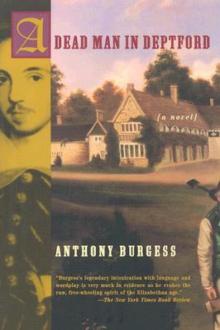 A Dead Man in Deptford
A Dead Man in Deptford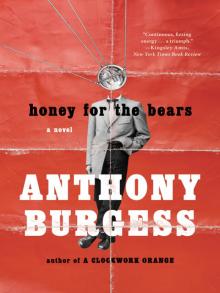 Honey for the Bears
Honey for the Bears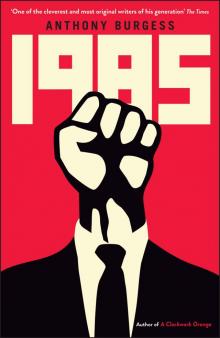 1985
1985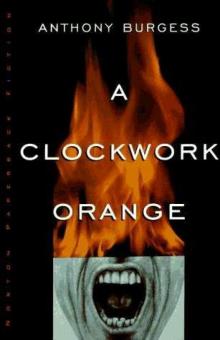 A Clockwork Orange
A Clockwork Orange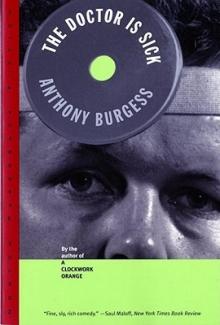 The Doctor Is Sick
The Doctor Is Sick Earthly Powers
Earthly Powers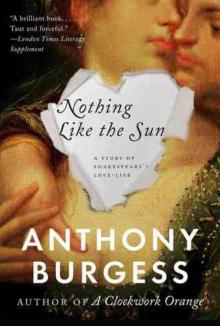 Nothing Like the Sun
Nothing Like the Sun Collected Poems
Collected Poems The Kingdom of the Wicked
The Kingdom of the Wicked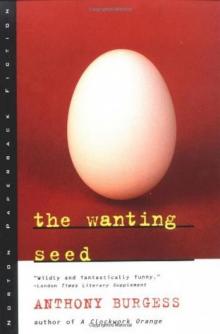 The Wanting Seed
The Wanting Seed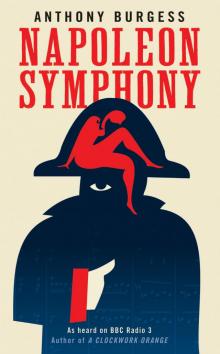 Napoleon Symphony
Napoleon Symphony The Malayan Trilogy
The Malayan Trilogy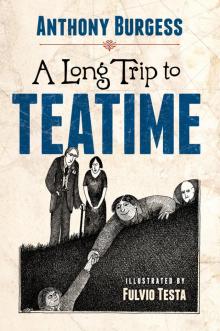 A Long Trip to Teatime
A Long Trip to Teatime Enderby Outside
Enderby Outside M/F
M/F The Complete Enderby
The Complete Enderby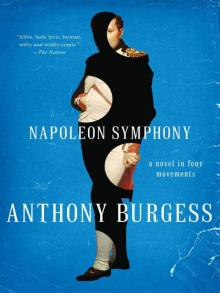 Napoleon Symphony: A Novel in Four Movements
Napoleon Symphony: A Novel in Four Movements Enderby's Dark Lady
Enderby's Dark Lady The Clockwork Testament (Or: Enderby 's End)
The Clockwork Testament (Or: Enderby 's End) ABBA ABBA
ABBA ABBA A Clockwork Orange (UK Version)
A Clockwork Orange (UK Version)